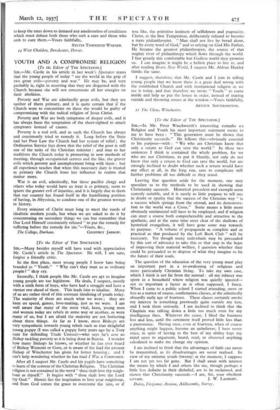[To the Editor of THE SPECTATOR.]
Sia,—In Mr. Peter Winckworth's interesting remarks oa Religion and Youth his most important statement seems to me to have been : " This generation must be shown that Christianity succeeds." He follows this—obviously essential to his purpose—with " We who are Christians know that only a return to God can save the world." In those two sentences I think is contained the whole problem, for we who are not Christians, to put it bluntly, not only do not know that only a return to God can save the world, but are strongly inclined to doubt whether such a return would have any effect at all, in the long run, save to complicate still further problems all too difficult as they stand.
Leaving that question aside for the moment, one may speculate as to the methods to be used in showing that Christianity succeeds. Historical precedent and example seem scarcely suitable, and it is surely to little purpose to tell one in doubt or apathy that the success of the Christian way " is a success which springs from the eternal, and its demonstra- tion to the world was a Cross." Some means a little more obviously sentimental will have to be employed, and if religion can steer a course both comprehensible and attractive to the apathetic, and at the same time steer clear of the shallows of hysterical evangelism, it will have gone some way towards its purpose. " A volume of propaganda as complete and as practical as that produced by the Left Book Club " will be necessary. Yet though many individuals may be persuaded by this sort of advocacy to take this or that step in the hope of improving their material welfare, I question whether they could be persuaded so to dispose of what they imagine to be the future of their souls.
The question of the education of the very young must play an important part in a re-awakening of religious and more particularly Christian living. To take my own case, which I think is not far from the normal : all my infancy was spent in a household where religion was quietly ignored— not so important a factor as is often supposed, I fancy. When I came to a public school I started attending, more or less as a matter of course, confirmation classes, at the admittedly absurdly early age of fourteen. These classes certainly awoke my interest in something previously quite outside my ken, and I took them seriously. I am inclined to think that the Chaplain was talking down a little too much even for my intelligence then. Whatever the cause, I liked the business less and less, until the ceremony itself proved little less than a pantomime. Having once, even at fourteen, when of course anything might happen, become an unbeliever, I have never since, in spite of having to the best of my ability kept my mind open to argument, heard, read, or observed anything calculated to make me change my opinion.
I am inclined to think that the advantages of faith can never be transmitted, as its disadvantages are never realised. In view of my extreme youth (twenty) at the moment, I suppose I am not yet too far gone. But I shall await with interest the means by which I and others like me, though perhaps a little less definite in their disbelief, are to be reclaimed, and shown that Christianity succeeds.—I am, Sir, your obedient














































 Previous page
Previous page